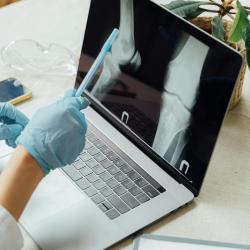Understanding of the impact of menopause on bone health is so important, and why is that? Women are much more likely to be diagnosed with osteoporosis and menopause does have something to do with this.
Although we don’t want fear to be a part of women's perception of the menopause, if they need to be scared about anything; it is their bone health. We want to raise awareness of the significance of osteoporosis and its devastating impact for many women.
A book I would recommend is Dr Jen Gunter’s menopause manifesto which has a very helpful chapter about bone health.
She describes: Osteoporosis is a condition where the bones become fragile, increasing their risk of fracture. Osteoporosis means there is a decrease In the amount of bone mass and microscopic alterations to the architecture. There are also some other changes in the bone quality that aren’t well understood.
Bone health is a continuum, while osteoporosis reflects one end of the scale and the highest risk of fracture, many more women have low bone mass, which also increases their risk of fracture but is not yet osteoporosis. This use to be called osteopenia, we no longer use that term now.
If you are in your 30’s you are losing bone whilst you are reading this. Bone is reactive tissue, it is constantly remodelled, meaning it’s re-absorbed and new bone is laid down, in fact our entire skeleton in replaced about every 10 years.
After a woman reaches her peak bone mass in her late twenties, it is a bit like money in the bank; you want some descent savings of bone mass early on in your life. In your 30’s the bone mass balance tips slightly in favour of bone loss and there is a small but steady decline, around 0.4% per year.
Oestrogen is women’s main reproductive hormone and a major player in bone formation.
The time of most rapid bone loss starts approximately one year before the final menstrual period, lasting about 3 years, that is the time you move from peri to post-menopausal.
On average women lose 6% of her bone mass during this period, but it can be as much as 15%.
After this period of 3 years, bone loss continues but a a lower rate, although still at a higher rate than before the MP, about 0.5 to 1% a year.
It is not just menopause that impacts bone health, age, stage of menopause, alcohol intake of more than 3 units a day, eating disorders, genetics and medical conditions like rheumatoid arthritis and type 2 diabetic also have an impact. Medication, lifestyle and nutrition also play a part, Dr Kalia, in his osteoporosis blog last month, mentioned for instance the importance of Vitamin D.
Now Consider a woman age 65 or older, she is living independently and breaks her hip, one year later she has a 50% chance of being unable to live independently and a 40% chance of being unable to walk independently.
It feels there is a cultural acceptance of osteoporosis, yet why are so many women simple unaware of their osteoporosis risk, and that there is preventative treatment? Our mantra is, ageing is inevitable, fragility is not. We want to change this societal acceptance that it is ok to be a fragile old lady.
The bottom line is that all women over 65 that are not on preventative treatment should be screened, and many younger women with any risk factor or fragility fractures need testing.
The good news is that exercise, nutrition and medication like menopausal hormone therapy, HRT is highly effective.
Exercise can help bone health, muscles pull on bones and weight-bearing produces stress on bone - exercise helps bone health. Osteoblasts, the cells that build bone, are stimulated by mechanical signals from exercise.
Next time we will talk more about the best exercise, we will talk about the benefit of resistant exercise and low bone denisity, and there is some helpful research out there.
Ask reception to be booked in for a menopause MOT - We will look at, and advice on all aspect of being at your best during the menopause and beyond.
Our Barnes Clinic
Our clinic is located in Barnes, South-West London and is easily accessible by public transport.
For more information including parking and other practicalities see our Barnes clinic page
Book an Appointment
Booking an appointment with one of our therapists is quick and easy. There is no long waiting time and you don’t need a referral from your GP.




